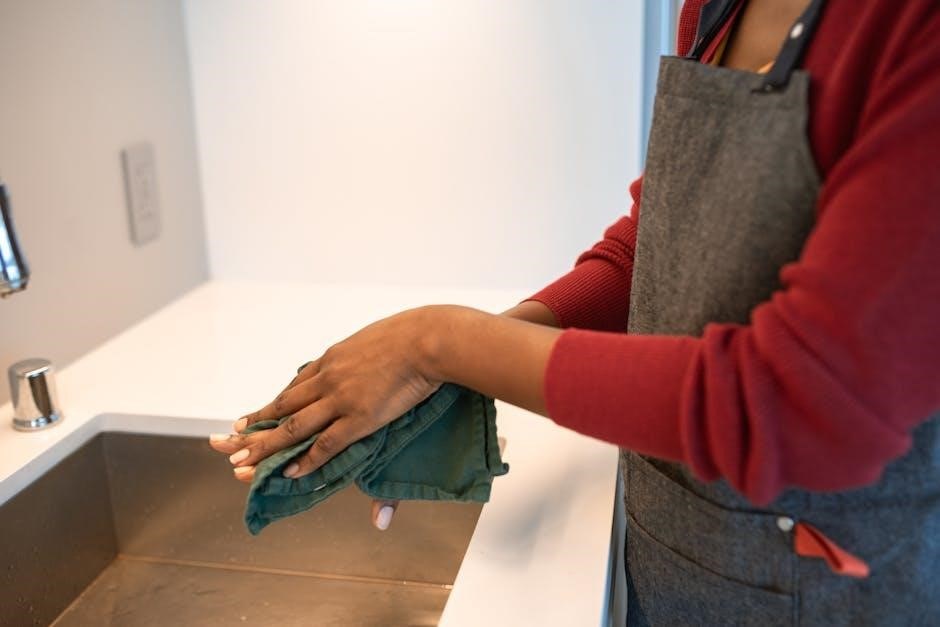
Transforming household tasks into engaging games boosts productivity and makes chores enjoyable for everyone. By turning cleaning‚ organizing‚ and maintenance into fun challenges‚ families can foster responsibility and teamwork while making daily routines more exciting.
Benefits of Gamification
Gamification of household chores offers numerous benefits‚ including increased intrinsic and extrinsic motivation. By turning tasks into games‚ individuals‚ especially children‚ feel more engaged and willing to participate. This approach fosters a sense of responsibility and teamwork‚ making chores less daunting. It also boosts productivity‚ as clear goals and rewards encourage completion of tasks. Gamification can enhance family bonding by creating shared experiences and healthy competition. Additionally‚ it teaches valuable life skills‚ such as time management and problem-solving‚ in a fun and interactive way. The sense of accomplishment and satisfaction from achieving milestones further motivates individuals to maintain their efforts. Overall‚ gamifying chores creates a positive environment where tasks are viewed as opportunities for growth rather than burdens.

Strategies for Gamification
Effective strategies include assigning clear tasks‚ setting time challenges‚ and using rewards. Techniques like chore charts and fun competitions make tasks engaging and achievable for everyone.
3.1 Assigning Clear Tasks
Assigning clear tasks is essential for successful gamification of chores. Begin by breaking down larger tasks into smaller‚ manageable steps. For example‚ instead of saying “clean your room‚” specify actions like picking up toys‚ dusting‚ or making the bed. This clarity helps individuals understand expectations and focus on achievable goals. Use visual aids like checklists or charts to outline responsibilities‚ ensuring everyone knows their role. Additionally‚ providing concrete examples of tasks‚ such as “wipe the kitchen counter” or “sort laundry‚” makes it easier for participants to stay on track. Clear assignments reduce confusion and frustration‚ fostering a sense of accomplishment as each task is completed. This approach also allows for fair distribution of work‚ promoting teamwork and accountability within the household.
3.2 Setting Time Challenges
Setting time challenges is a dynamic way to gamify chores‚ turning tedious tasks into exciting races against the clock. Establish a timer for specific chores‚ such as cleaning a room in 10 minutes or washing dishes quickly. This approach creates a sense of urgency and makes tasks more engaging. For example‚ “Beat the Timer” games can be used to motivate individuals to complete tasks efficiently. Time challenges also foster healthy competition‚ especially when involving family members. Rewards can be tied to speed‚ encouraging participants to improve their performance. This strategy not only boosts productivity but also makes chores feel less overwhelming. By incorporating time-based challenges‚ household tasks become fun‚ dynamic‚ and achievable‚ transforming them into enjoyable activities rather than burdensome duties.

Tools and Resources
Utilize apps like Tody‚ ChoreMonster‚ and Habitica to track tasks and rewards. These tools help gamify chores with point systems‚ streaks‚ and fun challenges for the whole family.
4.1 Chore Tracking Apps
Chore tracking apps like Tody‚ ChoreMonster‚ and Habitica transform chores into engaging experiences. Tody allows users to create and manage task lists‚ earning rewards as they complete chores. ChoreMonster gamifies tasks with point systems and fun challenges‚ making it ideal for families. Habitica takes it further by turning chores into RPG-style quests‚ where completing tasks levels up your character. These apps provide visual progress tracking‚ reminders‚ and customizable reward systems. They cater to both individuals and families‚ offering features like shared task lists and competitive leaderboards. By leveraging these tools‚ households can maintain organization while fostering a sense of achievement and teamwork. Such apps are essential for modern families aiming to make chores enjoyable and rewarding for everyone involved.

Examples of Chore Games
Scavenger hunts and sock-matching races are fun ways to engage everyone. These games turn chores into adventures‚ fostering teamwork and responsibility while making tasks enjoyable and productive for all.
5.1 Scavenger Hunts
Scavenger hunts are a creative way to turn chores into an exciting adventure. By creating a list of tasks or items to find‚ families can transform cleaning or organizing into a fun competition. For example‚ a “cleaning scavenger hunt” might involve finding and putting away toys‚ books‚ or household items. This approach not only makes chores more engaging but also encourages teamwork and problem-solving. Setting a timer or offering small rewards adds an extra layer of motivation‚ making the experience enjoyable for both kids and adults. Scavenger hunts can be tailored to suit different ages and abilities‚ ensuring everyone feels included and accomplished. This method is an excellent way to foster a sense of responsibility while making household tasks feel like a game.
Involving the Whole Family
Involving the whole family in gamified chores fosters teamwork and responsibility‚ making tasks more enjoyable for everyone. Assigning age-appropriate tasks ensures each member can contribute‚ creating a sense of unity. Turning chores into a family-wide activity encourages collaboration and shared goals‚ making the process less daunting. For example‚ younger children can focus on simpler tasks like picking up toys‚ while older members handle more complex jobs. This collective effort not only distributes the workload but also teaches valuable life skills. By working together‚ families can complete tasks more efficiently and build stronger bonds. This approach also helps children understand the importance of contributing to the household‚ fostering a sense of pride and accomplishment. Making chores a family affair ensures everyone feels involved and valued‚ turning a mundane routine into a positive experience.

Tracking Progress
Tracking progress is essential to maintaining motivation and accountability in gamified chores. By monitoring tasks completed‚ individuals can see their achievements and stay encouraged to continue. Tools like chore charts‚ apps‚ or whiteboards provide visual reminders of what’s been accomplished and what’s left to do. Many apps allow users to earn badges or points as they complete tasks‚ creating a sense of accomplishment. Regular check-ins or family meetings can also help review progress and celebrate successes. This transparency fosters accountability and reinforces the idea that contributions matter. Tracking progress not only helps individuals stay on track but also builds a sense of pride in their efforts. It’s a simple yet effective way to keep the momentum going and ensure chores remain engaging and rewarding for everyone involved.

Cultural Aspects
Cultural aspects play a significant role in shaping how households approach chores and gamification. In many cultures‚ teamwork and collaboration are highly valued‚ making group-based chore games particularly effective. For instance‚ in some societies‚ family unity is emphasized‚ and turning chores into shared activities strengthens bonds and fosters a sense of collective responsibility. Additionally‚ cultural differences influence reward systems‚ with some cultures favoring tangible rewards while others prefer verbal praise or symbolic recognition. Adaptability is key to ensuring gamification strategies resonate across diverse cultural contexts. By aligning chore games with cultural values‚ families can create a more engaging and meaningful experience. This approach not only makes chores more enjoyable but also promotes cross-cultural understanding and respect for different traditions and practices.
Gamifying household chores offers a transformative approach to making tasks more engaging and enjoyable for everyone. By incorporating elements like challenges‚ rewards‚ and teamwork‚ families can turn mundane routines into exciting activities that foster responsibility and collaboration. This method not only boosts productivity but also creates lasting memories and a positive household environment. As explored throughout this guide‚ strategies such as clear task assignments‚ time challenges‚ and creative games provide a framework for success. Tools like chore-tracking apps and cultural adaptability further enhance these efforts. Ultimately‚ gamifying chores is a versatile and effective way to make daily tasks more enjoyable while promoting a sense of accomplishment and unity. Start your journey today and watch how your home becomes a place where work and play blend seamlessly together!